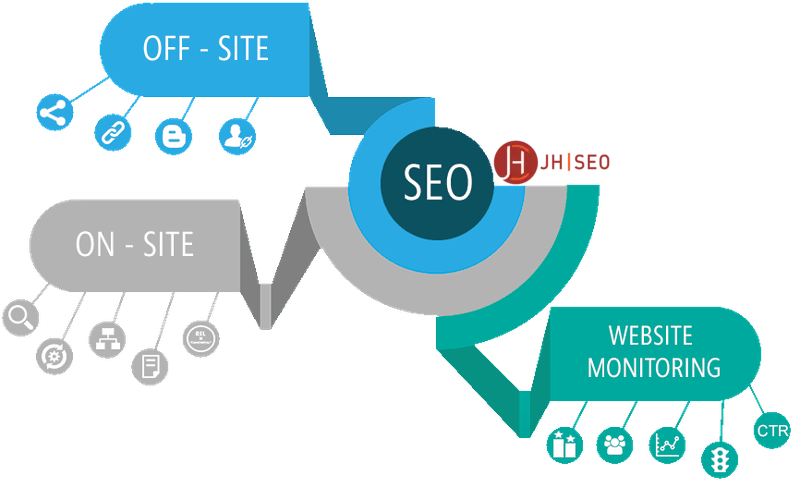In a digital landscape where every keystroke can lead to a sale or a missed opportunity, search engine optimization (SEO) is the unsung hero, quietly steering the course of your online visibility. However, the world of SEO is not merely about peppering keywords into web content; it’s an intricate, evolving strategy that fuses technical finesse with audience insight. So, what is SEO management?
What Is SEO and How Does It Work?
At its core, SEO is the practice of increasing the quantity and quality of traffic to your website through organic search engine results. It stands for Search Engine Optimization, which involves crafting your online assets in a way that speaks the language of search engines to help them understand your content, thus directing the right users your way.
SEO as a digital marketing partner is a multifaceted endeavor. Firstly, it considers what people are searching for (the keywords), then it takes into account the on-page elements of your content (meta tags, keyword density, internal links), assesses the off-page components like backlinks, and the often overlooked technical aspects (site structure, page speed, mobile-friendliness) that underpin it all.
Google’s search algorithms are notoriously complex and secretive, but here’s a simple version of how they work:
- Crawl: Search engines have bots that constantly scour the internet for content.
- Index: These bots take the content they find, and store it in a massive database.
- Rank: When a user performs a search, the search engine looks into the index and brings back the most relevant results, ranking them based on hundreds of factors that include page quality, relevance, and usability.
An SEO manager is to tip these factors in your website’s favor.
Key Components of SEO Management
SEO encompasses several key areas that demand regular attention and finesse to execute a successful SEO strategy:
- On-Page Optimization – On-page SEO focuses on the content of your website. It includes optimizing keywords, meta descriptions, titles, and internal linking structures to make your content more attractive to search engine crawlers.
- Off-Page Optimization – Off-page SEO deals with the activities that happen outside your website, such as link building, and social media marketing. This is about establishing your website’s authority and credibility in the online world.
- Keyword Research – Understanding the words and phrases your audience uses to search is crucial for targeting the right traffic. Effective keyword targeting is the compass that guides your content strategy/content marketing and informs your website’s overall SEO performance.
- Content Strategy – Content and SEO are inseparable. Creating high-quality, relevant content that aligns with your keyword strategy and appeals to your target audience is fundamental to SEO success.
- Technical SEO – This is the invisible structure that supports your site’s on-page and off-page efforts. It includes improving site speed, mobile-friendliness, the structure of URLs, and indexing/crawling directives.
On-Page vs. Off-Page vs. Technical SEO Management
SEO management is typically broken down into three main categories: on-page, off-page, and technical SEO. Here’s what differentiates them:
On-Page SEO
On-page SEO is the optimization of individual web pages to rank higher and earn more relevant traffic in search engines. This means increasing the relevance of your content and ensuring it’s readable to both search engines and real people. This involves optimizing elements on your website so they appeal to search engine crawlers, including:
- Title tags
- Meta descriptions
- Headings (H1, H2, H3, etc.)
- URL structure
- Page content and keyword placement
- Image alt attributes
On-page optimization is all about providing cheery welcome mats for search engines and visitors alike.
Off-Page SEO
Off-page SEO is the actions taken outside of your website to impact your rankings within search engine results pages (SERPs). This largely concerns link-building – encouraging reputable sites to link back to yours. The reasoning is straightforward; if a lot of great websites link to yours, your website must be pretty great too, right?
Technical SEO
Technical SEO is entirely separate from page content and focuses on the infrastructure of your website. It’s about making sure search engine crawlers can access, interpret, and index your website without any problems. This encompasses many complex factors, such as:
- Site speed
- Crawl errors
- XML sitemaps
- Structured data
- Mobile-friendliness
- Site architecture
- HTTPS and website security
Technical SEO is the foundation of your search strategy; without a solid foundation, even the best content and off-site tactics won’t help you rank.
User-Focused Content
At the heart of achieving successful SEO management is an understanding of the user’s intent. Search engines, led by Google, are getting smarter at understanding not just the words people type in a search bar, but what they are looking for. This is why user-focused, high-quality content is increasingly important.
When you create content that provides real value to the user and solves their problem or answers their question, you’ve hit the SEO sweet spot. Here are some strategies to ensure your content is user-focused:
- Keyword Research: Start with understanding what your audience is searching for. Keyword research tools can give you insights into the language and terms your audience uses.
- Content Quality: The days of keyword stuffing are long gone. Content should be well-written, informative, and engaging. This not only helps with SEO but also keeps users on your site longer.
- Content Relevance: Each piece of content you create should have a clear topic, and it should also be relevant to the topic of your site as a whole.
- User Experience (UX): This includes elements like site navigation, mobile-friendliness, and site speed, all of which affect how long a user stays on your site and whether they come back.
- Multimedia: A mix of text, images, and video can make your content more engaging and easier to digest for users.
Is your content ticking all these boxes? If not, it might be time for a content strategy overhaul.
What Does SEO Management Involve?
SEO management is an ongoing process that involves several moving parts. Here’s a high-level look at what managing SEO typically involves:
Understand and Audit Your Current SEO Situation
Before you can improve, you must know where you stand. This involves understanding what keywords you currently rank for, what your backlink profile looks like, and what technical issues might be holding you back.
Set Clear Goals
What do you want to achieve with your SEO efforts? Maybe you want to increase organic traffic by a certain percentage, or rank number one for a specific keyword. Clear goals will give your strategy direction and make it easier to measure success.
Keyword Research and Strategy
Keywords are the foundation of your SEO strategy. You need to know what keywords are most important to your business, what your competitors are doing, and where the best opportunities lie.
On-Page and Technical Optimization
This is where you take what you’ve learned from keyword research and apply it to your website. It also involves fixing any technical issues that might be preventing search engines from properly indexing your site.
Content Creation and Link Building
Content is crucial for on-page SEO, and earning links from high-quality sites is a big part of off-page SEO. This is where you get to flex your creative muscles, creating content that’s both valuable and shareable.
Measure, Analyze, and Adapt
SEO doesn’t stand still, and neither should your strategy. You need to constantly measure the effectiveness of your efforts, analyze what’s working and what’s not, and adapt your strategy accordingly.
Stay Informed
Search engines are constantly updating their algorithms, and the best SEO managers are those who stay on top of these changes. This means staying informed about the latest SEO trends and best practices.
Managing SEO is complex and time-consuming, but the rewards can be significant. If you’re looking to enhance your online presence, boost traffic, or simply understand the digital marketplace a little better, then investing in an SEO management strategy is a must. With the guide above, you’re now well-equipped to take the first steps toward SEO mastery.
The Benefits of Effective SEO Management
A well-crafted SEO management strategy doesn’t just boost your site’s search rankings; it has a plethora of other benefits that translate into real business outcomes.
Improved Search Engine Rankings
Ranking among the top search results means increased visibility and a higher likelihood of being clicked on, which is vital for brand awareness and credibility.
Increased Organic Traffic
Organic traffic is a gold mine for online businesses. When your website is optimized for search engines, you can expect a steady flow of visitors looking for exactly what you offer.
Enhanced User Experience
Search engines like Google consider user experience as a ranking factor. A good SEO strategy often results in user-friendly websites that keep visitors coming back for more.
Higher Conversion Rates
When your website is optimized to meet the needs of search engines and users, it can boost conversion rates by providing the right information at the right moment during a user’s purchase path.
Best Practices for SEO Management
SEO is a dynamic field that requires vigilance and adherence to best practices for long-term success. Here are some strategies to keep your SEO management on point.
Regular Website Audits
Conducting regular audits allows you to identify what’s working and what’s not. It helps in detecting and fixing issues such as broken links, missing alt text, and slow-loading pages that can negatively impact your SEO.
Monitor and Analyze Performance Metrics
Your site’s performance data is invaluable. Tracking metrics such as bounce rates, time on page, and conversion rates can provide insights that inform your SEO strategy.
Stay Updated with Algorithm Changes
Search engines, particularly Google, frequently update their algorithms. Staying informed about these changes and adapting your SEO efforts accordingly is crucial to maintaining and improving rankings.
Utilize SEO Tools Effectively
Leveraging the right tools for keyword research, backlink analysis, and performance tracking can streamline your efforts and provide you with a competitive edge.
The Ongoing Challenges of SEO Management
SEO management is not without its challenges. It confronts practitioners with an unpredictable and constantly evolving landscape.
The Constantly Shifting SEO Terrain
What worked yesterday may not work tomorrow. A big part of SEO management is staying informed about industry changes and being agile enough to adapt.
The Battle of Competition
In a competitive online world, every business is a competitor. You’ll have to work harder and smarter to edge out your rivals.
Technical Complexities
The technical aspects of SEO, especially for amateurs, can be daunting. Understanding and implementing complex concepts like structured data or canonical URLs can be challenging.
Harnessing the Power of SEO Management Tools
There’s no shortage of tools designed to aid in your SEO management. From comprehensive suites like Moz and Ahrefs to more specialized tools like SEMrush for keyword research and analysis, the SEO market is brimming with alternatives.
Overview of Essential SEO Tools
Here’s a quick look at some of the most useful SEO tools that can significantly enhance your SEO management efforts:
- Google Analytics: The standard for web analytics is indispensable for understanding your users and tracking your SEO progress.
- Google Search Console: This free tool can show you how search engines interact with your site and offer valuable insights into your SEO performance.
- Moz: Renowned for its suite of SEO tools and resources, Moz provides everything from keyword research to link-building analysis.
- SEMrush: A versatile tool for keyword research, tracking the keyword strategy used by your competition, and running an SEO audit of your blog.
- Ahrefs: Known for its robust backlink and SEO analysis capabilities, Ahrefs is a powerful tool for understanding and improving your site’s ranking and traffic.
Each of these tools serves different purposes, but when used in harmony, they can form the backbone of a strong and informed SEO management strategy.
SEO management isn’t a one-time project but an ongoing commitment to understanding and optimizing your online presence. By incorporating SEO best practices, tools, and resources, you can ensure that your website remains a standout contender in the digital arena. Remember, SEO is not just about appeasing search engines; it’s about serving your users by providing the best possible online experience. In the marathon of the digital economy, those who heed the call of SEO will undoubtedly step past the finish line into online excellence.



































































































































































































































